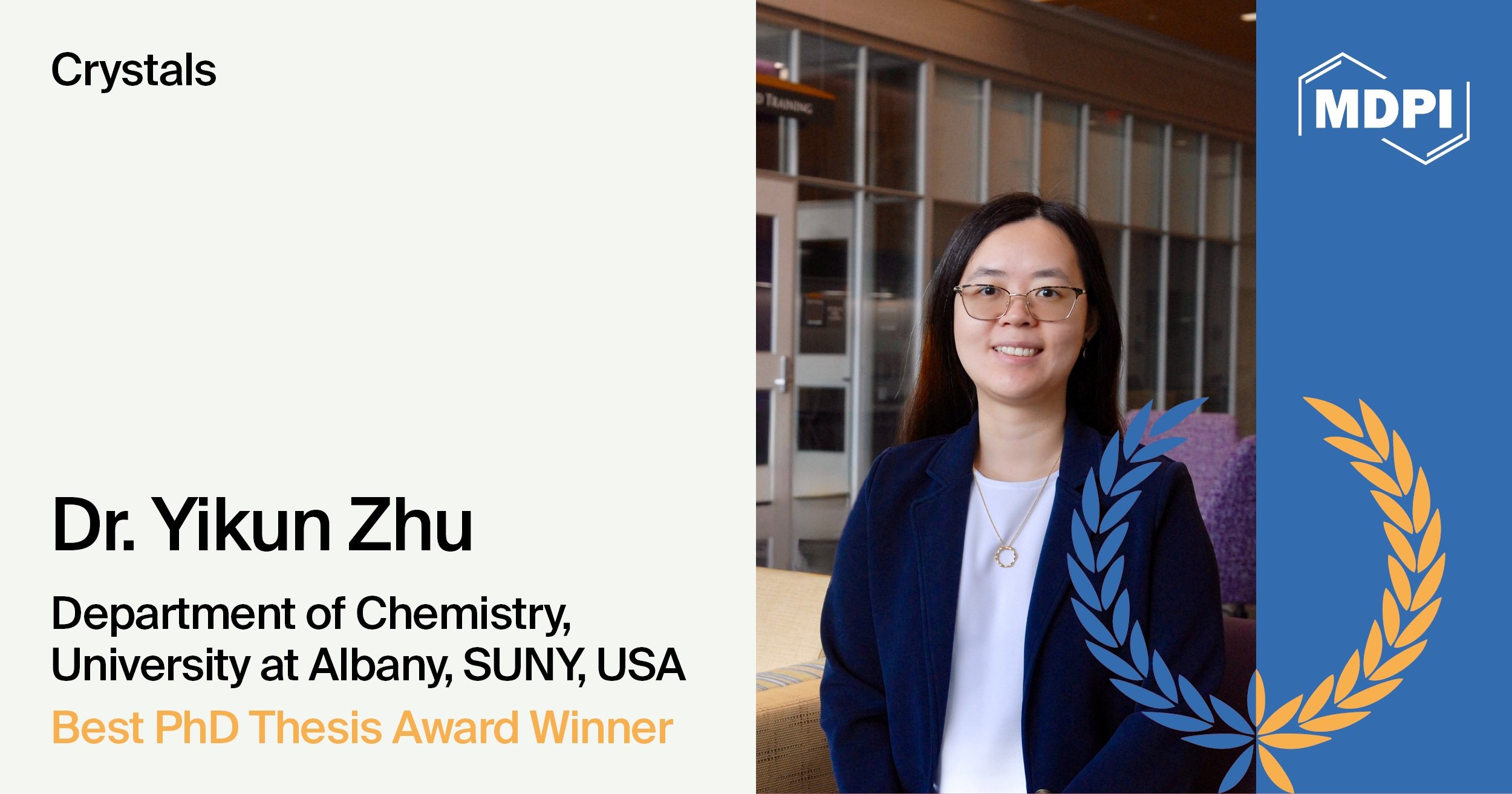Need Help?
9 October 2025
Interview with Dr. Yikun Zhu—Winner of the Crystals Best PhD Thesis Award

1. Could you introduce your research work during your PhD studies and the main objectives of your doctoral dissertation?
I spent my PhD studying the chemical reduction in molecular nanographenes. These carbon-based materials with extended π-surfaces are capable to hold additional electrons and serve as potential energy storage materials. Through chemical reduction methods, coupled with crystallographic and spectroscopic tools, we can explore not only the reduction limits and redox reversibility, directly related to charge/discharge capacity and reversibility, but also the alkali metal coordination pattern and carbon framework transformation pathways, offering insights into the nanostructure of anode materials and unraveling the molecular level behaviors upon electron addition.
My PhD dissertation aimed to examine the chemical reduction behaviors of curved molecular nanographenes. Compared to the planar fragments of graphene, these curved nanocarbons have 3D porous structures, providing higher Li+ affinity and faster charge transport rate, making them particularly prone to electron addition.
2. What was the biggest challenge you faced while pursuing your PhD, and how did you overcome it?
One of the major challenges throughout my PhD, common to nearly all projects, was the intrinsic instability of negatively charged nanocarbons. These reduced nanographenes are extremely sensitive to even trace amounts of air and moisture, making their isolation and characterization particularly demanding. I addressed this by establishing a systematic workflow: (a) optimizing glovebox and Schlenk techniques to minimize oxygen and water contamination, (b) employing in situ spectroscopic methods in combination with X-ray crystallography to trap and analyze the reduced products across different charge states, and (c) learning and applying computational methods to complement and rationalize the experimental findings. Overcoming this challenge also required me to quickly acquire and adapt to new techniques, often beyond my original skill set, to meet the demands of these highly sensitive systems. This process not only enabled me to obtain reliable data but also trained me to be persistent, resourceful, and interdisciplinary in tackling complex research problems.
3. In your opinion, what key qualities should an excellent PhD graduate possess?
I believe an excellent PhD graduate should demonstrate three key qualities: curiosity, resilience, and the ability to learn quickly. Curiosity drives one to explore scientific questions beyond the immediate scope of a project. For instance, during my PhD, I often encountered unexpected or “abnormal” experimental observations, which ultimately led to expansion of the original project and uncovering new insights. Resilience is equally important, as research with highly unstable reduced nanocarbons was full of setbacks that demanded persistence and adaptability to obtain reliable results. Finally, the ability to learn quickly is essential – whether it was mastering experimental techniques, or acquiring computational evidence, adapting to new skills allowed me to make meaningful progress. While no one can be an expert in everything, having a solid foundation across different areas also makes collaborations more effective. Together, these qualities helped me push the boundaries of knowledge and thrive in the dynamic and interdisciplinary environment of scientific research.
4. What are your future research plans, and what are your long-term career goals?
Building on the foundation of my PhD research on reduced nanographenes, I plan to continue exploring carbon-based materials at the molecular and nanoscale levels as a postdoctoral researcher. In particular, I am interested in understanding their electron-accepting capacity, alkali-metal interaction patterns, and the structural and electronic transformations that occur upon electron addition. These fundamental studies can open pathways to practical applications, including next-generation battery materials and carbon-based electronics. In the long term, I aspire to establish an independent research group where I can mentor students, foster interdisciplinary collaborations, and contribute to the development of sustainable, high-performance carbon materials for energy storage and electronic technologies.
5. How does it feel to receive this recognition for your work? Is there something you would like to express or someone you would like to thank the most?
It is a great honor to receive the Crystals Best PhD Thesis Award. This recognition affirms the scientific value of my work and highlights the collective efforts and guidance that made it possible. I am deeply grateful to my PhD advisor, Prof. Marina A. Petrukhina, whose mentorship and encouragement profoundly shaped my scientific mindset and career path. I would also like to thank my lab colleagues and collaborators for their teamwork and inspiring discussions. Above all, I owe heartfelt gratitude to my family for their unwavering support and encouragement throughout my PhD journey.

